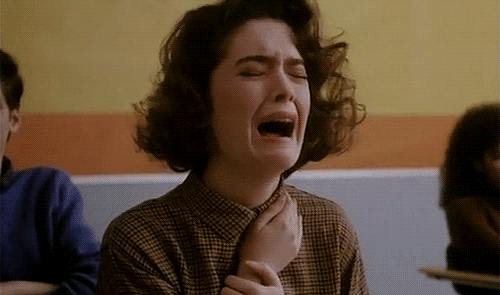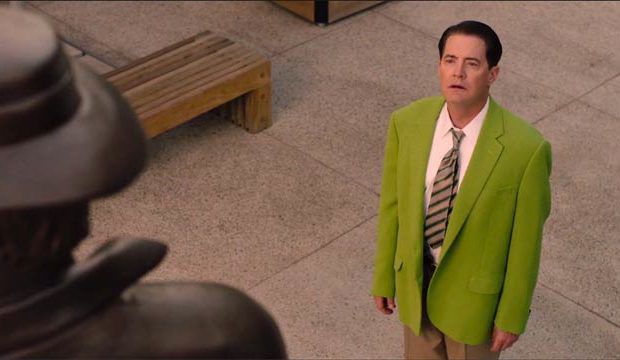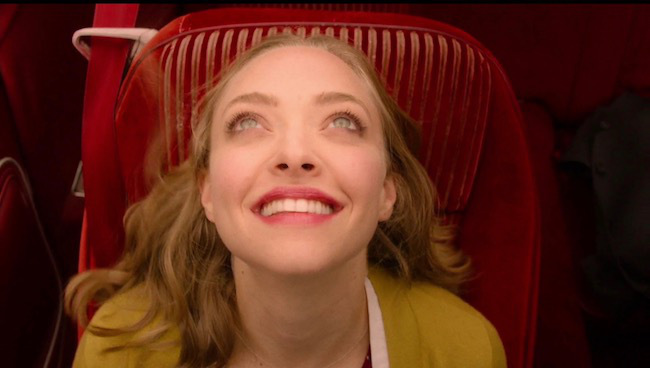Twin Peaks: The Return – Genre Mistuned
This summer, in an abbreviated but still smoldering Slow Burn, Len Gutkin, Benjamin Parker, and Michaela Bronstein discuss David Lynch's Twin Peaks: The Return.
In an influential 1996 essay on David Lynch, David Foster Wallace offers "an academic definition of Lynchian": "a particular kind of irony where the very macabre and the very mundane combine in such a way as to reveal the former's perpetual containment within the latter."1 This is good as far as it goes, but it misses the element of genre-play essential to all of Lynch and especially to Twin Peaks. Much of what seemed ironic in the original show was its mash-up of melodrama and supernatural horror, in which competing kinds of emotional intensity are forced into uneasy complementarity or disorienting synthesis. Such generic insouciance courts ridiculousness. When Friedrich Schlegel expatiates on irony, I think he might be talking about Twin Peaks: "There are ancient and modern poems which breathe in their entirety, and in every detail, the divine breath of irony. In such poems, there lives a real transcendental buffoonery."2 Often imitated, Lynchian genre-blending can look cheap and stupid in hands less assured than Lynch's own, all buffoonery and no transcendence.
As aesthetic institutions dependent on certain reliably elicited audience responses, genres might be said to be constituted by the emotions that attach to them. In an important forthcoming article in Victorian Studies, Justin Sider calls these "genre-feelings."3 Lynch loves playing such feelings off one another. For Twin Peaks, though, and probably for Lynch more generally, soap-operatic melodrama is not just one genre among others; because it is the genre of excessive emotionality par excellence, it acts as a kind of solvent and container for such subsidiary genres as noir and horror. Twin Peaks was soap-opera first, everything else second.

The first thing to notice, then, about Twin Peaks: The Return—at least the first several hours or so—is how cold it is in comparison to the original show. Glacial pacing, dialogue recorded at the margin of earshot, and a painterly attention to rigid corpses (there are four in the first episode, all mutilated) contribute to an unease that never quite gets into the groove of suspense. An opening murder-plot appears to involve such promising fare as adultery and betrayal—a school principal cheating on his wife with his librarian—but nothing soap-operatic ever emerges; we barely know who these people are before two of them are dead and one is in prison. There's a kind of buffoonery, but it's very low-key. "Uh oh," a detective says on encountering a body-shaped lump under a duvet. He and his partner remove the covers, revealing a woman's head set atop the decapitated, bloated body of a man. "Uh oh," the detective says again, fatuously. There's menace, too, offered most concentratedly by Mr. C, Cooper's BOB-infested doppelgänger (Kyle MacLachlan), but the real anxiety issues from the extraordinary duration of what feel like sinister but narratively hobbled preliminaries.
In one of her excellent Artforum dispatches on Twin Peaks: The Return, Sarah Nicole Prickett writes that Lynch "knows that irony is not sarcasm, is not really funny, and is never on purpose."4 This sounds true to me; reading it, I nodded along in agreement. It becomes confusing, though, the more one thinks about it. How can irony be divorced from intention? Wayne Booth, whose 1974 A Rhetoric of Irony remains the best book ever written on the subject, did not think it could be: "[S]o long as we remain interested in whether the work as made requires ironic reconstruction, we cannot ignore some picture of the intending author, much as we might like to."5 Perhaps, though, Prickett's "never on purpose" isn't meant to rule out intention completely.6 After all, the unintended nature of irony is something Lynch is said to "know," which must mean he does it on purpose. If Prickett's observation isn't a logical error, what can her point be?
In "The Concept of Irony" (1977), Paul de Man offers a definition that might be more compatible with Prickett's meaning. "Words," de Man writes, "have a way of saying things which are not at all what we want them to say....There is a machine there, a text machine."7 Irony, in other words, is not so much a rhetorical strategy as a default condition of language. In purporting to challenge Booth's intentionalism, de Man instead posits linguistic indeterminacy as the condition of possibility for rhetorical irony, not an alternative to it. This redirection can help make sense of Prickett's impression that Lynch "knows" something about irony that others don't. What he knows is that texts, narratives, and genres offer visions of experiential coherence which they cannot sustain or satisfy.
If genres always say more or less or other than they mean, Lynch focalizes and intensifies this intrinsic ambiguity. By a cagey (and at this point recognizably "postmodern," indeed to the point of cliche) aesthetic strategy, the original Twin Peaks inhabited genre worlds (soap-operatic melodrama; noirish police procedural; horror) with an absolute conviction that nevertheless belied palpable suspicion about the contingency of generic artifice. Unlike in the work of such skillful but less mysterious ironists as the Coen Brothers, the element of parody in Lynch is never deflationary; on the contrary, he is somehow more emotionally involving because of it. The original Twin Peaks was virtuosic in its fusion of the ridiculous and the emotionally shattering. As Dennis Lim puts it of Lynch generally, he "twist[s] established categories of sincerity and irony into new affective registers."8

But Twin Peaks: The Return gives us, in its first half, something like Lynchworld stripped of the codes by which we've learned to make sense of it. The original Twin Peaks had evolved its own genre-feeling; The Return stumbles back into Twin Peaks as if it recognized the ingredients but can't remember how to assemble them into a meal. Kyle MacLachlan's Dougie (Agent Cooper manqué, returned from the Black Lodge in body but not yet in spirit) is the master-stroke of this program of defamiliarization. Aphasic except for his persistent echolalia—a true text machine, for whom speech and intention are completely unrelated—Dougie wanders around Las Vegas waiting for meaning to return to him (or, rather, we're waiting. He's just shuffling). Tottering confusedly through a casino, Dougie sees a man hit the jackpot. "HellOOOoo!" the man says, in a pleased sing-song. Following a sort of willo'-the-wisp visible only to himself, Dougie hits jackpot after jackpot, repeating, each time the coins start flowing, the man's singsongy, drawn-out "hello." He doesn't know you're supposed to collect the coins; he leaves them where they lie. The whole segment is like an advertisement for slot-machines written by a brain injury patient. Lynch often gets read psychoanalytically, an unavoidable interpretive lens for an artist so obsessed by unknown or unconscious motive forces. But the tension Lynch offers in The Return is less that between conscious action and unconscious motivation, or even between the secular world and the demonic forces underlying it (both obvious preoccupations of the first Twin Peaks) than between empty event (including events of great brutality, like dismemberment and murder) and the narrative or generic systems that liberate mere bodies into significance.
Dougie's wanderings—dilated, frustrating, occasionally hilarious—provide the dominant tone for the first several hours of the show. He has been shadowed throughout, of course, by Mr. C, or Dark Cooper. But he has a different kind of double in Becky Burnett (Amanda Seyfried), who gets ecstatically high in a gloriously unexpected scene in the fifth episode. We meet Becky at the Double R Diner, where she's borrowing money from Shelly (Mädchen Amick). This is the territory of the old Twin Peaks—Shelly's still at the diner, right where we left her in 1991—but everything's off; we keep waiting to feel a familiarity that never arrives. (In the second half of the show, we'll discover that Becky is Shelly's daughter, but we don't know that yet.) Becky gets into a red convertible with a young guy, Steven, who we later learn is her husband (Caleb Landry Jones). They snort something (heroin?) He turns on the radio, which is playing The Paris Sisters' "I Love How You Love Me." Becky throws her head back and smiles; her face fills up the whole screen, seems to float above the car she's in. She closes her eyes ("I love how your eyes close," The Paris Sisters sing); she opens them; she smiles to herself with a kind of spaced-out lasciviousness. The scene lasts for a whole weird, over-saturated minute. In one way, Becky is Dougie's inverse—flooded with sensation, with emotion, with the pleasure of being alive. But she's also exactly like him: there's a spooky sense in which she's not really there at all.

There is at least one other exception to the muted emotional landscape of the first seven hours of The Return. In the sixth episode, a small child is killed by a truck. There's an excruciating build-up: we know the truck is barreling down on the town square, and we know the kid is playing in the street with his mother. But the speed and suddenness with which the truck obliterates the child from the screen is a genuine shock, as close to the feeling of real catastrophe as TV can get. A crowd gathers as the boy's mother runs to him, drops down in the street, cradles his corpse. The camera focuses on the crowd's reaction; their stunned, grieving faces model and reflect our own responses. But something's not right. Are they overdoing it a little? Are the actors acting badly? Are they amateurs? Why is the camera lingering on them for such a bizarrely long time, so that their faces, supposedly distorted by emotion, have come to look so unnatural? We're still reeling from the cruel surprise of seeing a kid crushed by a truck, but our response becomes unsure, awkward, during what seems like—what? some sort of film experiment in the physiognomy of emotion? It's a return of sorts, to all those anguished faces (Laura Dern's in Blue Velvet was the first) with which Lynch, channeling Douglas Sirk, makes his worlds so potent, so personal. But the anguish is out of key, distressingly detached from a narrative world in which it can signify coherently.
In their different ways, Dougie, Becky, and the melodramatically mourning crowd at the child's death are all mistuned—haunted, seduced, or bereaved by something they can't quite apprehend. Dougie is, quite literally, a transcendent buffoon, a clown-character striving to connect with a real self trapped in an inaccessible dimension, which is also to say with a genre in which he knows who he is again. Becky's a junky. The crowd on the street is us: moved and uncertain, watching very hard. Walter Pater has written of the "peculiar sentiment" with which Botticelli—like Lynch, an allegorist whose mysticism intersects with his persistently eroticized figures in compelling and confusing ways—"infuses his profane and sacred persons"; they are "comely, and in a certain sense like angels, but with a sense of displacement or loss about them—the wistfulness of exiles, conscious of a passion and energy greater than any known issue of them explains."9 The characters of Twin Peaks are animated by just such peculiar sentiments; they say and feel other than they mean, because they don't know what they mean. This is finally an irony of genre. Botticelli's Madonnas, according to Pater, are "peevish-looking"; this, he says, is their charm.10 They're not sure about the kind of story they're in; they can't harmonize with it. No one in The Return can, either.
ALSO IN THIS SERIES:
Ben Parker, "Around the dinner table, the conversation is lively" (8.18.17)
Michaela Bronstein, "Allegory as Alibi?" (8.25.17)
Len Gutkin, "Allegory and Dislocation" (9.16.17)
Ben Parker, "Going off the Grid" (10.4.17)
Michaela Bronstein, "The Anxiety of Spectatorship" (10.6.17)
Len Gutkin is a Junior Fellow in the Harvard Society of Fellows and a scholar of twentieth-century literature and film. His articles and review-essays have appeared or are forthcoming in ELH, Contemporary Literature, Literature Compass, Amerikastudien, The Times Literary Supplement, Boston Review, and elsewhere.
- http://www.lynchnet.com/lh/lhpremiere.html[⤒]
- As quoted in Paul de Man, Aesthetic Ideology, trans. Andrzej Warminski (Minneapolis: University of Minnesota Press, 1996), 177.[⤒]
- Justin Sider, Aesthetic Categories and the Social Life of Genres, forthcoming in Victorian Studies.[⤒]
- Sarah Nicole Prickett, "Eternal Return." https://www.artforum.com/film/id=68625 No other writer that I have read so consistently captures what watching Lynch feels like for his fans.[⤒]
- Wayne Booth, A Rhetoric of Irony (Chicago: Chicago UP, 1974), 120.[⤒]
- Prickett connects Lynch's knowledge of irony to race: "Atypically for such a white American, he knows that irony is not sarcasm, is not really funny, and is never on purpose." In this context, the implication is that minoritization entails a truer perception of ironies and an easier capacity to exploit them. I am reminded of James Baldwin, who, in The Fire Next Time, writes: "In all jazz, and especially the blues, there is something tart and ironic, authoritative and double-edged. White Americans seem to feel that happy songs are happy and sad songs are sad, and that, God help us, is exactly the way most white Americans sing them" (The Fire Next Time [New York: Vintage, 1992], 41).[⤒]
- Paul de Man, Aesthetic Ideology, trans. Andrzej Warminski (Minneapolis: University of Minnesota Press, 1996), 181.[⤒]
- Dennis Lim, David Lynch: The Man From Another Planet (New Harvest), 124.[⤒]
- Walter Pater, "Sandro Botticelli." http://www.victorianweb.org/authors/pater/renaissance/3.html[⤒]
- Ibid.[⤒]